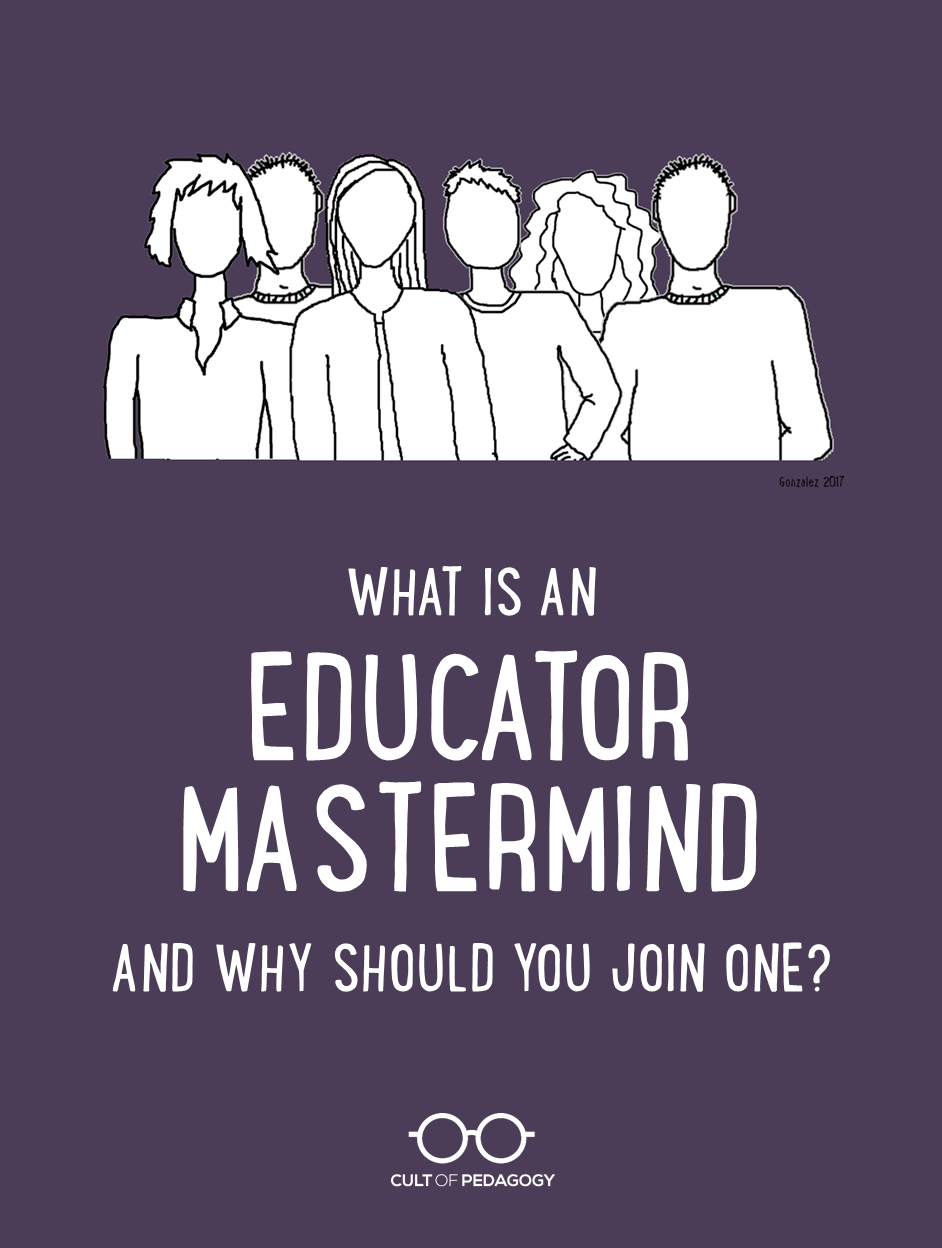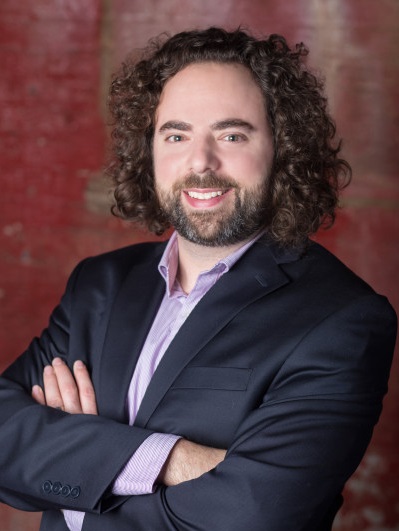
Listen to my interview with Daniel Bauer (transcript):
One of the crazy ironies of working in education is that we spend so much time surrounded by other human beings, but still work in isolation. That’s because the “other human beings” who fill up our days are mostly students; only a fraction of that time is spent in with our colleagues, other professionals who do the same work we do. If you’re an administrator, that isolation is even more acute. Because our days are so full, we rarely have time to talk deeply about our goals with our peers, to troubleshoot and problem solve, or to explore some of the big picture stuff that could really push our work to the next level.
To do that, we need to be more intentional. We need to find a group of like-minded peers and set aside time on a regular basis for these kinds of conversations. People in other fields, like in the business world, call these groups masterminds. Now the mastermind model is making its way into education.
One person who is leading the way for educator masterminds is Daniel Bauer, middle school principal and host of the Better Leaders Better Schools podcast. Bauer started his first school leader mastermind over a year ago. “I was in an assistant principal position, and I wanted to grow faster, but I didn’t have the resources or tools at my access to do that. And I was looking for something almost like another graduate class or something to push me, challenge my thinking and to be around others that were also going to challenge me.”

Daniel Bauer
His earliest attempts at the local level didn’t quite meet those needs. “I tried to start these local dinners where people would get together and we would discuss education and really be authentic, take the masks off and talk about our struggles and what we’ve learned from our mistakes. We had one or two of those dinners, and they were successful, but I didn’t want to do that once every six months. I wanted to do it at least every month, maybe every week.”
Then he found an online group—Aaron Walker’s Iron Sharpens Iron mastermind—and realized he could use that same model with other educators. So in the spring of 2016, he started his first mastermind for school leaders. Since then he’s created a few more that also include teachers and instructional coaches. In our interview (listen above), we talk about how his masterminds work, how they have benefited the members, and how you can start a mastermind of your own.
What exactly is a mastermind?
A mastermind is a small group of people who meet on a regular basis to talk about their work, set goals, learn together, and help each other solve problems.
Frequency: To be most effective, groups should meet on a consistent, predictable schedule—some meet once a week, others biweekly, and others monthly.
Group Size: Bauer has started his groups with about four members, then caps them at 10; any larger and people just don’t get enough personal airtime.
Members: Some masterminds strive to have members with the same roles—all administrators, for example—while others, like Bauer, find that members learn more with a mix of perspectives.
In person or online? Although it’s certainly possible to find people in our local area and meet in person, technology allows you to cast a wider net and build a mastermind that meets with tools like Skype, Zoom, or Voxer, which is my personal favorite. Groups may also choose to stay connected outside of the regular meetings by setting up a discussion in Slack or creating a private Facebook group.
The following section contains Amazon Affiliate links; if you purchase from Amazon after going through these links, Cult of Pedagogy receives a small commission at no extra cost to you.
A Typical Mastermind Format
Although every mastermind group may do things differently, this is how Bauer structures his groups’ hour-long weekly meetings:
- Check-in (10-15 min)
To start the hour, each member takes a turn sharing how the past week went and how they are doing right now. This time also serves as an accountability check, when members might report on whether or not they met the goals they set for themselves in the last meeting. - Book Discussion (10-15 min)
Reading and discussing books as a group can exponentially impact growth. Bauer’s groups occasionally read education-specific books, but more often they go outside of education to books on leadership, productivity, and mindfulness. Here are some titles he recommends:
Deep Work, by Cal Newport
Search Inside Yourself, by Chade-Meng Tan
The 12-Week Year, by Brian Moran and Michael Lennington
Procrastinate on Purpose, by Rory Vaden
The Miracle Morning, by Hal Elrod - Hot Seat (30 min)
During this time, the whole group focuses their energy on one person (people take turns being in the hot seat each week). That person talks about a current goal they are working toward or a problem they are wrestling with, and the other group members offer their insights, ask clarifying questions, and help that person come up with a plan. This process not only helps the person in the hot seat, it also helps the other group members. “If you’re not on the hot seat that week, it’s fantastic, because you get to add value and help somebody, which feels really, really great,” Bauer says, “and you’re going to be exposed to problems that you didn’t even know existed, so now you’re just a little bit wiser, a little bit more prepared for when that might come up at your school, and you’re getting more tools in your toolkit to help you solve problems.” - Goals for the week (5-10 min)
If time remains after the hot seat, each member takes a turn setting a goal for the upcoming week. This builds in accountability and will be discussed during check-in at the next meeting.
Tips for Mastermind Success
Choose members with care.
“Have a conversation with everybody that joins, because not everyone’s going to be a right fit,” Bauer advises. “You’ve got a culture that you’re building, you’ve got a type of environment that you want to protect, and you want people that are similar in the sense that they’re hungry, and they want to think deeply and they want to be authentic, and they’re going to be positive and not poisonous and toxic (or) suck up too much time.”
Strive for authenticity and relationships.
Although the purpose of a mastermind is to help everyone grow professionally, the group will be much more powerful if members trust one another and feel safe to share their weaknesses. That can only happen if individuals risk being vulnerable, and sometimes the first risk must be taken by the group leader. Bauer also advises groups to allow time and space for discussion of personal concerns. “The personal and the professional really can’t be separated,” he says. “Your vision has to be aligned. If your personal life’s not going so well, you’re probably not rocking it at work either. So we talk about all that stuff.”
Be consistent.
Groups that don’t meet on a regular schedule are unlikely to be successful. And building a consistent routine into the meetings themselves helps members know what to expect. “Having some sort of shared experience, so doing that with the routine, the check-in, the book, the hot seat, repeat, repeat, repeat— it builds a culture,” Bauer says.
Worth the Time
We all struggle to find time to get our regular tasks done, and setting aside even more for something like a mastermind may seem out of the question for you, but this is something that will definitely pay you back tenfold. We put a lot of focus on building relationships with and between our students, but we need those relationships with each other, too. Participating in an educational mastermind may be the most valuable professional development step you take; why not take it now?
“Alone we can do so little; together we can do so much.”
— Helen Keller
If you want to learn more about how to start your own mastermind, download Daniel Bauer’s Mastermind Toolkit, a comprehensive, 15-page guide to running a successful, thriving group.
Join our mailing list and get weekly tips, tools, and inspiration—in quick, bite-sized packages—all geared toward making your teaching more effective and fun. You’ll get access to our members-only library of free downloads, including 20 Ways to Cut Your Grading Time in Half the e-booklet that has helped thousands of teachers save time on grading. Come on in!!





Wow! I’m so new at this, but I have to hand it to you . . . THIS WAS SO MOTIVATING and ENCOURAGING and HELPFUL! When I joined Twitter, the way I explained it to others is ‘a whole new world opens up’ . . . I really appreciate you introducing me to so many wonderful resources – connecting me to great mentors – and expanding my world even more. THANKS so much! (I’m already thinking. . . ‘What if . . .’)
Sarah … glad you found the episode so helpful and inspiring. Make sure you download the toolkit if you want to start your own group and let me know if there is anything I can do to help!
This sounds very powerful! You state here that the group does not need to be the same role. But… have you heard or seen it done with teams? In my school we are supposed to be a PLC model but we struggle with really following the model in our math department. I like the meeting day/time and agenda consistency a LOT! I think that this model would work for our team to try and gel so we can work together better. What are your thoughts?
Kimberly … you bring in an interesting perspective. I honestly never thought of a Mastermind as a “protocol” for PLC meetings. In my experience and how I facilitate, it is really focused on personal and professional growth. Plus the “hot seat” is focused on one challenge an individual decided for herself. However, a teacher could absolutely ask a question to the group about an academic challenge her class is facing and crowd source a viable solution. The only potential hiccup I see is that the group you propose works together. It’s not impossible, but I think it takes a lot of time and a very special group to establish the amount of trust and candor that my groups have. We have a distinct advantage because we don’t work together so we able to be objective and candid. Let me know how it goes!
Such an interesting and informative post.
This is so great! I facilitate a laid-back group of teachers in my school, and I’m wondering about transferring that into a Mastermind. You mentioned in a previous response that it’s potentially difficult to have a group of co-workers. Do you have ideas on how I could be proactive in making this work well? You also mentioned in your podcast that some people might not be a good fit – almost like potential members need to be vetted. How do you tell someone “no” to joining a Mastermind? Thanks for your help and your insight, Daniel!
Lindsay … first thanks for your commitment to developing teachers. That’s awesome. Co-workers can be challenging because there is another layer before you get to authentic and vulnerable because of the work setting and work relationships. In terms of being proactive, maybe by hand selecting those that are “Ready” or I would argue emotionally healthy enough to “go there” with you and the group. I absolutely vet everyone that joins my Mastermind. I have to keep the crazies out, lol. In all seriousness, there are certain types of leaders that I want to work with. I want people that are 1) hungry to learn and are willing to invest, 2) want to build relationships and have good awareness about sharing space, and 3) want to give as much (or more) than they receive. That’s a winning combo in my book. How do I tell someone “No”? Again, easier for me since it’s my Mastermind and I don’t work with these folks. I politely thank the person for setting up the call and let them know that I don’t think that it would be the right fit (for them or for us). I also always try to be helpful and point them in a direction for other resources that might better serve them since the Mastermind didn’t work out. I hope this helped Lindsay. Feel free to leave a comment or email me with any other questions – DB (daniel@betterleadersbetterschools.com)
I am a classroom teacher who started a tutoring business–mostly SAT / ACT Test Prep–in 2015. I am interested in joining an online Mastermind group. Please advise.
Hey Patrick … You’ve come to the right place! Let’s chat and see if you’d be a good fit for one of my masterminds. If not, I can always point you in another direction! My email is daniel@betterleadersbetterschools.com. Please reach out and we’ll set up a call to discuss. I have a handful of calls regarding the Mastermind this week and would love to connect with you too!
Are there any ways to find active teacher mastermind groups? Would love to be apart of one?
Raedene,
Check out Daniel’s March 30th reply to Patrick and see if that might help.
As I was listening to this, my mind kept wandering to all of the questions that I would love to bring to such a forum. This is definitely an awesome way to grow and stay connected in a very isolated field. Loved this episode! I feel very inspired.
What do the initials, “ADDIE” stand for in the university community?
Hi Angela, according to this link, ADDIE is an acronym for an instructional design framework.